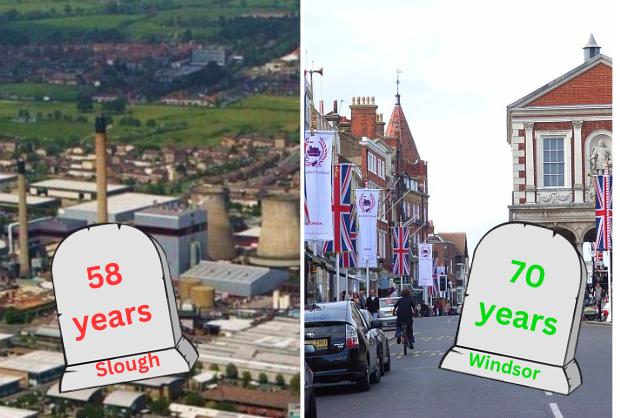From artisanal crepes to rebellious cheesecake waffles, Reading's breakfast rebels are transforming morning meals. These seven spots will revolutionize how you start your day.
Slough residents face a sobering reality as new data reveals their life expectancy ranks among the lowest in the South East. This alarming statistic raises questions about the town's health infrastructure and social determinants affecting longevity. While neighboring areas in the region enjoy higher life expectancies, Slough's men and women are falling behind, prompting concerns about local healthcare access, lifestyle factors, and environmental influences. As community leaders grapple with these findings, the spotlight turns to potential interventions that could bridge this life expectancy gap and improve the overall well-being of Slough's population.

The Stark Reality: Slough's Life Expectancy Crisis
Recent data has cast a shadow over Slough, revealing that its residents face significantly shorter life expectancies compared to their neighbors in the South East. This troubling statistic has sent shockwaves through the community, prompting urgent discussions about the underlying causes and potential solutions.
Dr. Sarah Thompson, a local public health expert, explains, "We're seeing a complex interplay of factors contributing to this disparity. From access to healthcare to environmental conditions and lifestyle choices, each plays a crucial role in determining longevity."
The figures show that men in Slough can expect to live to 78.6 years on average, while women fare slightly better at 82.4 years. However, these numbers fall short of the regional averages, highlighting a pressing need for intervention.
Unraveling the Causes: A Multifaceted Challenge
Several key factors have been identified as potential contributors to Slough's life expectancy gap. Economic disparities, air pollution from nearby industrial areas, and higher rates of chronic diseases like diabetes and heart disease are all under scrutiny.
Local councilor Amina Patel emphasises the importance of addressing these issues holistically: "We can't look at this problem in isolation. It's about creating a healthier environment, improving education on lifestyle choices, and ensuring everyone has access to quality healthcare."
Community health initiatives are already underway, with free health check-ups available at the Slough Wellbeing Centre every Tuesday and Thursday from 9 AM to 5 PM. These screenings aim to catch potential health issues early and provide residents with personalised advice on improving their wellbeing.
Bridging the Gap: Community-Led Solutions
In response to these alarming statistics, Slough's community leaders are rallying to implement change. The newly launched "Slough Lives Longer" campaign aims to raise awareness and promote healthier lifestyles through a series of workshops, fitness programs, and nutritional guidance sessions.
Local businessman and campaign supporter, Raj Sharma, shares his perspective: "It's about empowering our community with knowledge and resources. We're not just talking about adding years to life, but life to those years."
The campaign kicks off with a town hall meeting on January 15th at 7 PM in the Slough Community Centre, where residents can voice their concerns and contribute ideas for improving the town's health outcomes. Additionally, a dedicated hotline (0800-SLOUGH-HEALTH) has been set up to provide information on local health services and support programs.
As Slough faces this sobering reality, the community's response will be crucial in turning the tide. With concerted efforts from local government, healthcare providers, and residents themselves, there's hope that future generations will enjoy longer, healthier lives in this diverse and resilient town.
A Call to Action: Shaping Slough's Healthier Future
The life expectancy crisis in Slough serves as a stark reminder of the health inequalities that can exist even within prosperous regions. This situation mirrors challenges faced by other post-industrial towns across the UK, highlighting the need for targeted interventions that address the unique socio-economic factors affecting each community.
As Slough embarks on its journey to improve residents' longevity, it has the opportunity to become a model for other struggling areas. The "Slough Lives Longer" campaign, if successful, could provide a blueprint for community-led health initiatives nationwide.
Residents can play a crucial role in this transformation. Beyond attending the town hall meeting on January 15th, individuals can contribute by:
1. Volunteering for health awareness programs at local schools and community centers.
2. Participating in the Slough Park Run, held every Saturday at 9 AM in Salt Hill Park, to promote physical activity.
3. Supporting local farmers' markets to improve access to fresh, nutritious foods.
4. Joining the "Slough Clean Air" initiative, which organises monthly tree-planting events to combat air pollution.
By actively engaging in these efforts, Slough's residents can take ownership of their community's health destiny. As the town faces this challenge head-on, it has the potential to not only close the life expectancy gap but also to forge a stronger, more resilient community united in the pursuit of a healthier future.